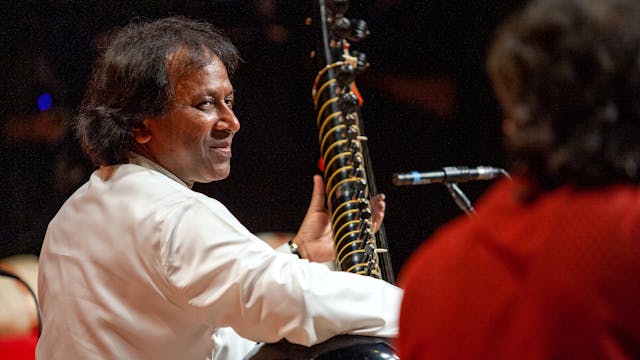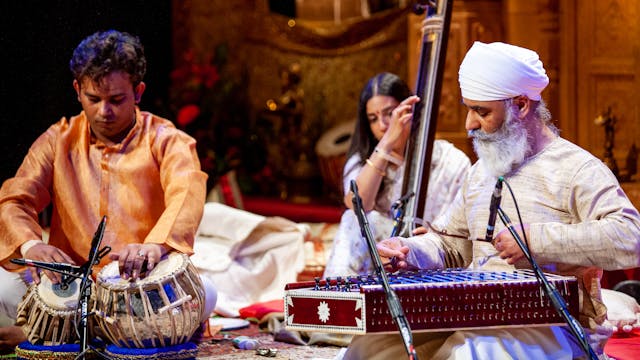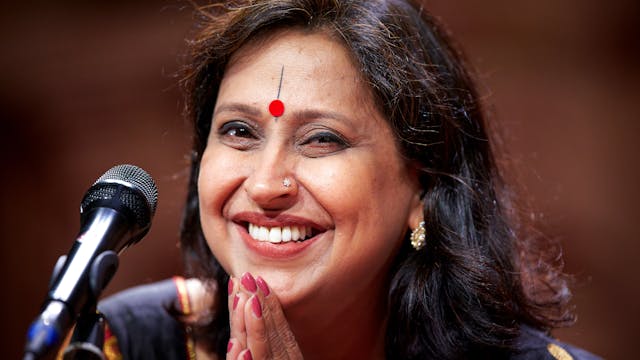Parveen Sultana | Gujari Todi
Morning Ragas
•
54m
Recorded at Darbar Festival 2007, on 15th April, at the Phoenix Theatre, Leicester.
Musicians:
- Begum Parveen Sultana (Patiala gharana)
- Partha Sarathi Mukherjee (tabla)
- Chiranjib Chakraborty (harmonium)
- Nina Burmi (tanpura)
- Gunwant Dhadyalla (tanpura)
- Debipriya Das (support)
- Ranjana Ghatak (support)
Raag Gurjari Todi, Thaat: Todi, Samay: Morning
Begum Parveen Sultana gives an outstanding performance of this morning raga, Gurjari Todi, at the Darbar Festival 2007. After a last-minute visa-related issue of the scheduled artists leading to a cancellation of their concerts, she generously agreed to fill the morning slot at the Phoenix theatre, Leicester on the 14th of April, 2007.
Incidentally, this is also the first day in the lunar calendar of the Indians, marking a special occasion and a new beginning. For us, it marked another new beginning of our relationship with Begum Sultana. She was already a member of our Darbar family; With this gesture, she tied us in a bond of friendship and love for a lifetime.
Begum Sultana introduces the raga with a variety of combination of ‘swaras’ traversing all four octaves. The vilambit khayal set to a 12-beat cycle of Ektaal, was spread over an expanse of 48 micro-beats, giving her ample space and scope to explore the inner recesses of this raga.
The faster composition set to Teental is rendered embellished with taans at four times the speed of the composition. Begum Sultana winds up beautifully and brings this section to an exuberant end with praises for her co-artists.
Yogesh Samsi’s nuanced accompaniment only makes the recital more delightful. His solos are a fiery combination of virtuosity and passion. Chiranjib Chakraborty is a revelation on the harmonium. He had replaced Pandit Ajay Joglekar at the last minute but had left no stone unturned in giving a whole-hearted performance of noteworthy character and quality.
One of the more popular varieties of Todi, this beautiful raga is said to have originated in Gurjar region (Gujarat). This is also known as Gujri Todi.
Thaat: Todi
Jaati: Shaadav-Shaadav (6-6 notes in ascent-descent)
Swaras: Komal Rishabh-Gandhar-Dhaivat, teevra Madhyam, rest shuddh swaras, Pancham is dropped in both ascent and descent.
Vaadi: Komal Dhaivat ( d )
Samvaadi: Komal Rishabh ( r ) (Komal Gandhar (g) according to some)
Time: Late morning
Mood: somber with raudra rasa, desolate
Aaroh (ascent): S r g m d N S’ (Western Notes: C C# D# F# G# B C)
Avaroh (descent): S’ N d m g r S (Western Notes: C B G# F# D# C# C)
Key phrases: S, d.n.Srg, rgmg, dmgr-grS, mdNS’r’S’, NdmdNdmgr,grS
Olden treaties describe this as the ragini of Bhairav; but modern view differs and treats it as a variety of Todi which drops Pancham completely; specially to stay at a safe distance from Miyan ki Todi. Though accepted as a raga depicting powerful raudra rasa, this can also evoke a barrage of pathos (as interpreted by Ustad Amir Khan, especially in ‘Man ke panchhi’).
Up Next in Morning Ragas
-
Shahid Parvez | Miyan Ki Todi
Recorded at Darbar Festival 2007, at 15th April, at the Phoenix Theatre, Leicester.
Musicians:
- Ustad Shahid Parvez (sitar)
- Pandit Yogesh Samsi (tabla)
- Debipriya Das (tanpura)Raag Miyan Ki Todi, Thaat: Todi, Samay: Morning
Parvez begins with a serene alap of this morning raga, delineatin...
-
Harjinderpal Matharu | Bhoopal Todi
Recorded live at the Phoenix Hall, Leicester, UK at Darbar Festival on 13th April 2007.
Musicians:
- Harjinderpal Singh (Santoor)
- Shahbaz Hussain (Tabla)
- Ranjana Ghatak (Tanpura)Music Pieces:
- Raag Bhoopal Todi, Thaat: Bhairavi, Samay: Morning
- Alaap, jor, jhalla and gat in rupak taal (7... -
Arati Ankalikar Tikekar | Raag Ahir B...
Recorded at Darbar Festival 2011, on 23rd April, at King's Place, London.
Musicians:
- Arati Ankalikar (khayal vocal)
- Anubrata Chatterjee (tabla)
- Chinmay Kolhatkar (harmonium)
- Omkar Dalvi (pakhawaj)
- Priya Prakash (tanpura)
- Shobhana Patel (tanpura)Raag Ahir Bhairav, Thaat: Bhairav...



